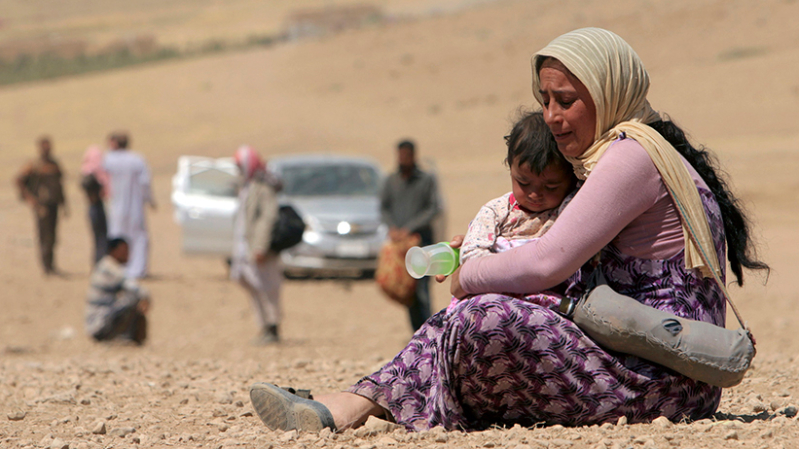
"I am struck by the widespread apathy and indifference and ignorance concerning this issue among Christians, let alone others," said Timothy Samuel Shah, associate director of the Religious Freedom Project at the Berkley Center for Religion, Peace, and World Affairs at Georgetown University in Washington, D.C.
Christians in the U.S. must stop their apathy to the bloody persecution of religious minorities in Iraq and Syria, this was the sentiment of the religious freedom advocate who proposed an "examination of conscience" for faith communities, as reported by Angelus News.
Shah gave a speech at a Dec. 4 Heritage Foundation panel on "Christian martyrs today." The panel said they would welcome a designation of genocide by the U.S. for Christians, Yazidis, and other ethno-religious minorities targeted by ISIS in Iraq in Syria, but Shah added that much more must be done by U.S. Christians to aid these persecuted groups.
"Just as a basic matter of our experiencing the suffering of our brothers and sisters in some kind of way, experiencing some kind of solidarity, we are failing the test," he said, calling his own Catholic parish "pretty indifferent" to the plight of persecuted religious minorities in Iraq and Syria.
"I don't hear a lot of real outrage from Christian leaders about this issue, on a regular, consistent basis," Shah said. "Where are the widespread demonstrations? Where are letters by thousands and thousands of pastors to appropriate leaders to do more about this? Where are the spontaneous grassroots campaigns? I don't see them."
According to Catholic News Agency (CNA) ISIS, also known as ISIL, the Islamic State, and Daesh, has inflicted countless heinous acts - including murder, torture, rape, slavery, and displacement - upon religious and ethnic minorities of Iraq and Syria, as well as upon Sunni Muslims who do not agree with their caliphate.
More than 100,000 Christians have been displaced in the Nineveh Plain in Iraq alone. ISIS has also defiled, pillaged, and destroyed shrines, churches, and ancient artifacts that some have called an effort to destroy an entire culture.
However, Christians cannot wait for political leaders to act, Shah insisted, adding that Christian mobilization will bring about policy action.
"It is supremely ridiculous, if I may say, to ask the Obama administration to bear the moral weight of this issue when we don't bear any of the moral weight of this issue ourselves," he said.
He proposed a sort of examination of conscience for Christians and parishes, asking questions like:
"Do our congregational prayers reflect a deep concern about what's happening to our brothers and sisters, patriarchs from Syria and Iraq?
"Do our Sunday schools feature any kind of discussion or teaching about what's happening to our Christian brothers and sisters?
"Does our catechetical instruction feature a discussion about these kinds of issues, both the basis of religious freedom as well as empirically what's happening to the Body of Christ around the world?"
The answer to the questions is pretty clearly "no," he said. "We have no intellectual, emotional, empirical, spiritual connection to what is happening to our brothers and sisters."
The panel insisted that religious freedom for people of all faiths must be a priority, and Christians cannot just deplore Christian persecution while ignoring persecution of other religious minorities.
The papacy, beginning with Pope Pius XI and culminating in the reign of Pope St. Paul VI and the issuance of the Vatican II document Dignitatis Humanae, began preaching religious freedom as part of fundamental human dignity after the rights of Christians were under assault from fascist and totalitarian regimes in the early 20th century, Shah explained.
The popes clearly saw that religious freedom is "rooted in the dignity of the human person," he said, and yet Christians even today are unwilling to advocate that people of all faiths enjoy such freedom.
"We just have to admit that even some of the advocacy for persecuted Christians has a tone and has a quality that isn't really concerned about the religious freedom of other people," he said, pointing to the "rise of nativist rhetoric" after the Paris terror attacks as an example.
The call for religious freedom is stronger if members of all faiths are involved, insisted Roger Severino, director of the DeVos Center for Religion and Civil Society at the Heritage Foundation.
Statements from various faith leaders carry lots of weight, he said, adding that there need to be Jewish, Muslim, Yazidi, and Druze voices speaking out against persecution of all religious minorities by ISIS. "All faiths are under attack" when members of one faith are attacked for not believing, he said.






